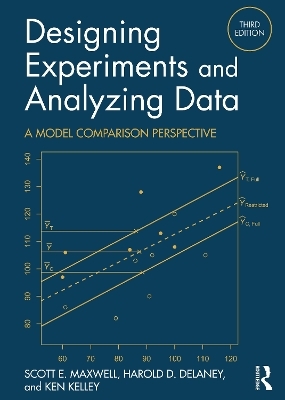
Designing Experiments and Analyzing Data
Routledge (Verlag)
978-0-367-20264-4 (ISBN)
Designing Experiments and Analyzing Data: A Model Comparison Perspective (3rd edition) offers an integrative conceptual framework for understanding experimental design and data analysis. Maxwell, Delaney, and Kelley first apply fundamental principles to simple experimental designs followed by an application of the same principles to more complicated designs. Their integrative conceptual framework better prepares readers to understand the logic behind a general strategy of data analysis that is appropriate for a wide variety of designs, which allows for the introduction of more complex topics that are generally omitted from other books. Numerous pedagogical features further facilitate understanding: examples of published research demonstrate the applicability of each chapter’s content; flowcharts assist in choosing the most appropriate procedure; end-of-chapter lists of important formulas highlight key ideas and assist readers in locating the initial presentation of equations; useful programming code and tips are provided throughout the book and in associated resources available online, and extensive sets of exercises help develop a deeper understanding of the subject. Detailed solutions for some of the exercises and realistic data sets are included on the website (DesigningExperiments.com). The pedagogical approach used throughout the book enables readers to gain an overview of experimental design, from conceptualization of the research question to analysis of the data. The book and its companion website with web apps, tutorials, and detailed code are ideal for students and researchers seeking the optimal way to design their studies and analyze the resulting data.
Scott E. Maxwell is the Fitzsimons Professor of Psychology at the University of Notre Dame. His research interests are in the areas of research methodology and applied behavioral statistics, with much of his recent work focusing on statistical power and accuracy in parameter estimation, especially in randomized designs. Professor Maxwell has served as editor of Psychological Methods, received the Samuel J. Messick Award for Distinguished Scientific Contributions by the American Psychological Association’s Division of Evaluation, Measurement, & Statistics, and has received multiple teaching awards. Harold D. Delaney is Emeritus Professor of Psychology at the University of New Mexico, where he received the University’s Outstanding Graduate Teacher of the Year award. His research interests in applied statistics include methods that accommodate individual differences among people. Professor Delaney received a Fulbright Award from the U.S. Department of State to spend an academic year lecturing in Budapest, Hungary. Ken Kelley is Professor of Information Technology, Analytics, and Operations (ITAO) and the Associate Dean for Faculty and Research in the Mendoza College of Business at the University of Notre Dame. His work is on quantitative methodology, where he focuses on the development, improvement, and evaluation of statistical methods and measurement issues. Professor Kelley is an Accredited Professional Statistician (PStat®), recipient of the Anne Anastasi early career award by the APA's Division of Evaluation, Measurement, & Statistics, a fellow of the American Psychological Association, and an award-winning teacher.
Part I: Conceptual Bases of Experimental Design and Analysis 1. The Logic of Experimental Design and Analysis 2. Drawing Valid Inferences from Experiments Part II: Model Comparisons for Between-Subjects Designs 3. Introduction to Model Comparisons: One-Way Between-Subjects Designs 4. Individual Comparisons of Means 5. Testing Several Contrasts: The Multiple-Comparisons Problem 6. Trend Analysis 7. Two-Way Between-Subjects Factorial Designs 8. Higher Order Between-Subjects Factorial Designs 9. Designs with Covariates: ANCOVA and Blocking Extensions 10. Designs with Random or Nested Factors Part III: Model Comparisons for Designs Involving Within-Subjects Factors 11. One-Way Within-Subjects Designs: Univariate Approach 12. Higher-Order Designs with Within-Subjects Factors: Univariate Approach 13. One-Way Within-Subjects Designs: Multivariate Approach 14. Higher Order Designs with Within-Subjects Factors: The Multivariate Approach Part IV: Mixed-Effects Models 15. An Introduction to Mixed-Effects Models: Within-Subjects Designs 16. An Introduction to Mixed-Effect Models: Nested Designs References Appendix
| Erscheint lt. Verlag | 6.12.2024 |
|---|---|
| Zusatzinfo | 218 Tables, black and white; 75 Halftones, black and white |
| Verlagsort | London |
| Sprache | englisch |
| Maße | 178 x 254 mm |
| Themenwelt | Geisteswissenschaften ► Psychologie |
| ISBN-10 | 0-367-20264-6 / 0367202646 |
| ISBN-13 | 978-0-367-20264-4 / 9780367202644 |
| Zustand | Neuware |
| Informationen gemäß Produktsicherheitsverordnung (GPSR) | |
| Haben Sie eine Frage zum Produkt? |
aus dem Bereich


